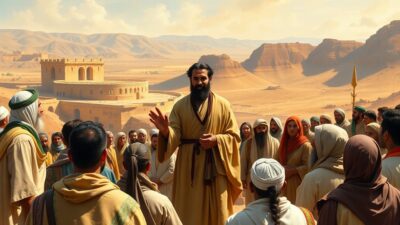
From Mythology to DNA: A Facebook Exchange on Science, Religion, and the Sons of Noah
By Scotty Reid – In a recent Facebook thread, I found myself drawn into a fascinating, albeit exhausting, debate that began with a simple comment on a science video. The video explored how scientists pinpointed the interbreeding of Neanderthals and modern humans through DNA analysis, a compelling topic rooted in genetics and history. However, the conversation took a surprising turn when a commenter brought up biblical mythology, igniting a debate that strayed far from the realm of science.
The Catalyst: Ham, Shem, and Japheth

Judy Carpenter, one of the first commenters, posted a succinct but puzzling reply to the video: “Ham, Shem, Japheth.” These are the supposed sons of Noah from the Bible. While the connection between their names and the genetic findings in the video was unclear, I suspected Judy might have been suggesting that the three sons represented the Denisovans, Neanderthals, and modern humans.
Unable to let such a claim pass unchallenged, I responded directly:
“Ridiculous fictional characters that didn’t exist anywhere outside of Jewish mythology.”
The Religious Turn: Enter Gina Adams
It wasn’t long before the thread took a sharp turn toward theology. Gina Adams, another participant, responded by quoting scripture, specifically the verse proclaiming that “every knee will bow and every tongue confess the name of Jesus Christ.” While her intent seemed to be defending the broader validity of the Bible, her comment missed the mark of the original discussion entirely. My response to her was pointed:
“But they won’t be confessing Ham, Shem, Japheth now, will they?”
This rebuttal aimed to highlight the disconnect between her argument about Jesus and the mythological figures of Noah’s sons. Yet, rather than bringing clarity to the discussion, it only seemed to fan the flames.
Clarifying Belief: Why I Don’t Identify as a Christian
At this point, it’s important to clarify my own position. While I believe in Yeshua and follow his teachings, I do not identify as a Christian. The label carries a heavy burden of historical and ongoing atrocities committed in its name—atrocities that stand in stark contradiction to the principles Yeshua taught. From the justification of slavery to colonial conquests and modern-day bigotry, many who claim the mantle of Christianity have used the Bible to commit and defend crimes against humanity.
This is why I reject the label, even if others might attempt to apply it to me. I find inspiration in what some have said about early followers of Yeshua, who were referred to as “People of the Way.” This term resonates with me because it reflects Yeshua’s own words when he described himself as “the truth, the light, and the way.” It also connects to the Koran, which acknowledges Yeshua as a historical figure, though in a different context than the Bible. My frustration with many self-proclaimed Christians stems from their apparent disconnect between the teachings of Yeshua and their actions or beliefs.
A Question of Evidence
Returning to the thread, I addressed Gina directly to separate my belief in Yeshua from the mythology of Noah:
“I know Jesus exists; there is evidence of his life in non-biblical sources. I don’t have to believe in the fictional Noah and his sons to obtain eternal life. I am a follower of Yeshua; I am not a Jew who believes in the Torah.”
At this point, it was clear that some participants were conflating belief in Yeshua with belief in every story within the Bible, including those with no historical or archaeological basis. I further clarified:
“And did I say anything about Yeshua? No, I did not. I said something about the fictional sons of Noah. If you don’t know what people are talking about, it’s best to mind your business.”
The Final Straw: Travis Stewart Joins In
The most perplexing argument came from Travis Stewart, who attempted to equate the existence of historical figures like Caesar and Herod with the existence of Noah. He wrote:
“Did Caesar exist? Did Herod exist? Did Jesus of Nazareth exist? All have been proven to exist and all are mentioned in the… you guessed it… Bible.”
This line of reasoning ignored a fundamental distinction: historical figures like Caesar and Herod are supported by extensive non-religious historical records, whereas Noah exists solely within the Torah. My reply encapsulated my frustration:
“This is nonsense. Noah doesn’t exist outside of the Torah. As for Jesus, also known as Yeshua or ‘the Christ’ as Roman historians referred to him, there are sources outside of the Bible that mention him. I am a follower of Yeshua’s teachings, and I know he exists because I have been in his and the Father’s presence.
What baffles me is how people can’t seem to make up their minds about whether they want to be Jews, believe in the Torah, and follow it, including believing in some of its fictional or mythological characters like Noah. The story of Noah building an ark to save animals and his family, then restocking the earth with every species known to us today, and his family incestuously repopulating the earth—this simply doesn’t hold up for me.
I don’t believe in Shem, Ham, or Seth either. So why are y’all bringing up Yeshua in this context? Prove to me that the Noah and the Ark story is real. Point me to archaeological evidence or historical sources outside of Jewish mythology. By that logic, I suppose Zeus and the Roman Pantheon of gods are real too, just because someone wrote stories about them. Lord, give me patience with these folks.”*
Reflections on the Exchange
This exchange highlighted a recurring challenge in online discussions: the inability to separate mythology from history. The Bible, like many religious texts, contains a mix of historical accounts, allegories, and cultural traditions. Recognizing this distinction doesn’t diminish one’s faith but invites a more thoughtful and nuanced understanding.
The story of Noah and his sons is a powerful allegory, but it’s just that—an allegory. There is no archaeological or historical evidence to support the notion that a single family repopulated the earth after a global flood. Yet, for many, rejecting this myth feels like rejecting their faith entirely.
For me, following Yeshua means striving to embody his teachings and principles, not adhering to every story in religious texts. It also means rejecting the harmful actions that have been carried out in the name of Christianity and standing firm against misrepresentations of faith.
Final Thoughts
 What began as a discussion about genetics and science veered into mythology and then into debates about faith. It served as a reminder of how deeply intertwined these topics are for many people—and how important it is to approach such conversations with both conviction and patience.
What began as a discussion about genetics and science veered into mythology and then into debates about faith. It served as a reminder of how deeply intertwined these topics are for many people—and how important it is to approach such conversations with both conviction and patience.
For those of us who value critical thinking, it’s vital to challenge inaccuracies while respecting others’ beliefs. At the same time, we shouldn’t shy away from pointing out that science and faith can coexist without requiring us to believe in every ancient story as literal truth.
